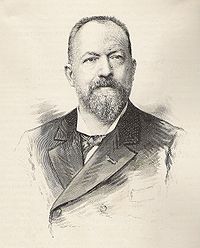
Alexandre Lapissida
Encyclopedia

Tenor
The tenor is a type of male singing voice and is the highest male voice within the modal register. The typical tenor voice lies between C3, the C one octave below middle C, to the A above middle C in choral music, and up to high C in solo work. The low extreme for tenors is roughly B2...
, producer, director and theatre manager.
Life
First singing at StrasbourgStrasbourg
Strasbourg is the capital and principal city of the Alsace region in eastern France and is the official seat of the European Parliament. Located close to the border with Germany, it is the capital of the Bas-Rhin département. The city and the region of Alsace are historically German-speaking,...
, he was taken on by Théâtre de la Monnaie
La Monnaie
Le Théâtre Royal de la Monnaie , or the Koninklijke Muntschouwburg is a theatre in Brussels, Belgium....
in Brussels
Brussels
Brussels , officially the Brussels Region or Brussels-Capital Region , is the capital of Belgium and the de facto capital of the European Union...
in 1868, where he spent most of his career. There he was made a régisseur in 1871 and served as the theatre's joint head with violinist Joseph Dupont
Joseph Dupont (violinist)
Henri-Joseph Dupont was a Belgian violinist, leader, theatre director and conductor.-Life:Dupont was born in Ensival, Verviers. He studied the violin at the Liège and Brussels conservatoires and won a Belgian Prix de Rome for composition in 1863...
from 1886 to 1889. They then passed that position on to Stoumon
Oscar Stoumon
Oscar Stoumon was a Belgian composer, music critic, playwright and theatre director....
and Calabresi. After that Lapissida was taken on by the Opéra de Paris as régisseur général and producer. He produced the Opéra's main operas of the late 19th century including Le Mage by Jules Massenet
Jules Massenet
Jules Émile Frédéric Massenet was a French composer best known for his operas. His compositions were very popular in the late 19th and early 20th centuries, and he ranks as one of the greatest melodists of his era. Soon after his death, Massenet's style went out of fashion, and many of his operas...
(1891), Faust by Charles Gounod
Charles Gounod
Charles-François Gounod was a French composer, known for his Ave Maria as well as his operas Faust and Roméo et Juliette.-Biography:...
(1893), Salammbô
Salammbô (opera)
Salammbô is an opera in five acts composed by Ernest Reyer to a French libretto by Camille du Locle. It is based on the novel Salammbô by Gustave Flaubert . The opera was first performed at the Théâtre Royal de la Monnaie in Brussels on 10 February 1890...
by Ernest Reyer
Ernest Reyer
Ernest Reyer, the adopted name of Louis Étienne Ernest Rey, was a French opera composer and music critic .- Biography :...
(1893), Otello by Giuseppe Verdi
Giuseppe Verdi
Giuseppe Fortunino Francesco Verdi was an Italian Romantic composer, mainly of opera. He was one of the most influential composers of the 19th century...
(1894), Frédégonde by Ernest Guiraud
Ernest Guiraud
Ernest Guiraud was a French composer and music teacher born in New Orleans, Louisiana. He is best known for writing the traditional orchestral recitatives used for Bizet's opera Carmen and for Offenbach's opera Les contes d'Hoffmann .- Biography :Guiraud began his schooling in Louisiana under the...
(1895), La Favorite by Gaetano Donizetti
Gaetano Donizetti
Domenico Gaetano Maria Donizetti was an Italian composer from Bergamo, Lombardy. His best-known works are the operas L'elisir d'amore , Lucia di Lammermoor , and Don Pasquale , all in Italian, and the French operas La favorite and La fille du régiment...
(1896) and Les Huguenots
Les Huguenots
Les Huguenots is a French opera by Giacomo Meyerbeer, one of the most popular and spectacular examples of the style of grand opera. The opera is in five acts and premiered in Paris in 1836. The libretto was written by Eugène Scribe and Émile Deschamps....
by Giacomo Meyerbeer
Giacomo Meyerbeer
Giacomo Meyerbeer was a noted German opera composer, and the first great exponent of "grand opera." At his peak in the 1830s and 1840s, he was the most famous and successful composer of opera in Europe, yet he is rarely performed today.-Early years:He was born to a Jewish family in Tasdorf , near...
(1897). Lapissida seems to have left the stage by 1900.
Today the Bibliothèque-musée de l'Opéra holds an important part of his correspondence in its "fonds Lapissida".

